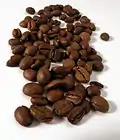Miko Coffee
Miko was fashioned from the words "Michielsen" and "Koffie" and was established in 1801 when Leo Michielsen started a grocery shop dealing in colonial merchandise. This included commodities such as rice, pepper, salt, exotic spices, tea and most importantly coffee. It was only at the turn of the century, around the year 1900, that the enterprise decided to develop a coffee roasting business under the Miko brand name as its main activity.
| Type | Public |
|---|---|
| Euronext: MIKO | |
| Industry | B2B Coffee |
| Founded | In 1801, Turnhout, Belgium |
| Headquarters | Turnhout, Belgium |
Key people | Frans Van Tilborg, Managing Director |
| Products | Whole Bean Coffee |
| Revenue | |
Number of employees | 631 |
| Subsidiaries | MikoPac, Mepaco, Miko Coffee Service |
| Website | www.miko.eu |
Throughout the remaining part of the 19th century as well early part of the 20th Michielsen Koffie (as it was known) passed down from generation to generation until in 1937 a large plot of redundant farmland was acquired on the outskirts of Turnhout, a small Belgian town close to the Belgian/Dutch border.
This was a significant turning point in the history of Michielsen Koffie and with it came the new shortened trading name of Miko. “Mi” for Michielsen and “Ko” for “Koffie! In fact Miko remains the trading name right up until today.
The three brothers running the business during the 1930s (Jan, Frans and Johan) did not envisage what was to follow and as Europe descended into War, difficult times followed.
However with much hard work and creativity Miko managed to survive this difficult period in world history. One of the ideas which kept the business alive during the war years was the decision to start roasting “acorns” just like coffee beans; it made Miko the creator of “Acorn Coffee.” This bitter, black derivative also known as “surrogate coffee” was drunk in large volumes throughout the war years. To be frank nothing else and better was available.
The period after the war was great for coffee, (no surprise after drinking acorns) and the boom years which followed quickly accelerated Miko's presence on the European coffee stage.
Miko was now at the fore of all new coffee innovation, which included;
Being the first to pack coffee into waterproof inner sachets pioneering the development of ground and vacuum packed coffee Being the first to launch the one cup filter concept (World Exposition, 1958)
In addition Miko added creative flair to their advertising by using retired world war zeppelins to promote their coffee brand across the many coastal regions of Northern Europe. The next significant landmark in the Miko history was in 1970 when the company reconsidered their position in the European coffee trade and decided to channel all future resource into the “out of home” market rather than join the already saturated retail industry. A strategy that remains at the core of today's business plan.
The product innovation, which followed, clearly separated Miko from the other major European coffee players. It led to the launch of the catering pot filter (a pre dosed 12 cup filter) and more recently the exciting new pouch pack concept.
In 1975 and following the success of Miko concepts in the “out of home market” a call centre was established in Brussels to deal with the growing number of direct coffee service customers. When launched this operation employed a handful of people. Today the same business employs over 100 skilled coffee service individuals dedicated at making Miko the number one name in Coffee Service.
The seventies was therefore a crucial period in the history of Miko coffee.
In the eighties diversification was the key word. A logical step in this process was to start assembling professional coffee machines in Turnhout.
Miko therefore set up a separate but related business known as Mepaco, whose priority was to assemble coffee machines.
This operation continues today, successfully supporting the coffee division of the Miko group. In fact Miko is one of a handful of coffee companies throughout the world, which can not only roast coffee but also manufactures coffee-making equipment.
The final milestone in the Miko history was its launch on the Brussels stock exchange in 1998. The objective being to inject the necessary finance to fulfil all future business objectives.[2]
Operations
Miko is listed on the Brussels Stock Exchange[3] currently has branches in many countries across Europe and Australia[4] and exports at present to 30 countries worldwide.
Countries currently with Miko Coffee locations

